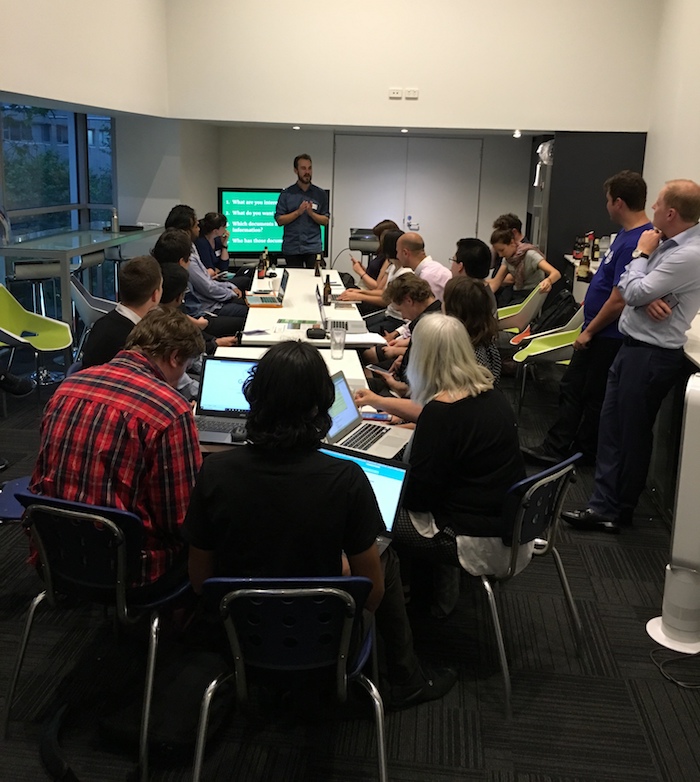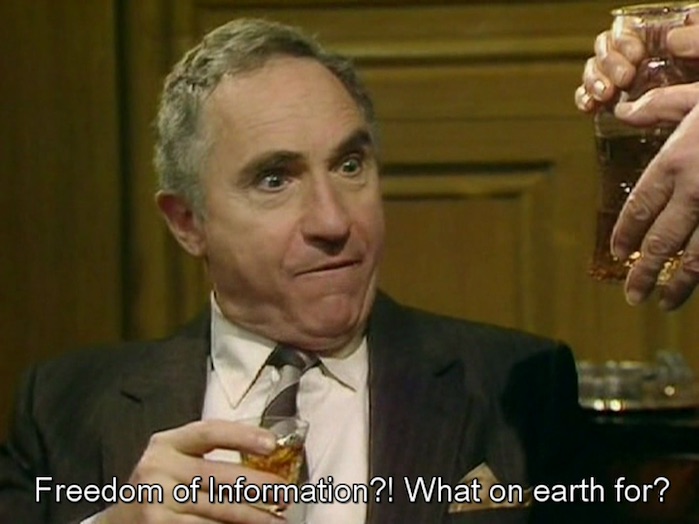Most people I speak to about making Freedom of Information requests think it’s too difficult to waste time on—it’s for lawyers, not them. When I’ve seen our FOI system presented in a teaching context, the clear message is ‘FOI is too hard, too slow, and too expensive’. The message has sunk in, including with journalists, lawyers, researchers, and activists, many of whom have decided not to worry with it.
This assessment doesn’t ring true with my experience, or what I see in the 2500 requests made through Right To Know, our best public record of our FOI system. The results you get vary wildly depending on what you’re asking for, which public body you’re asking, and who’s processing it for you on their end. In my experience, FOI is often free, fast, and easy. I’ve taken to popping in a request on my phone at lunch when an interesting question comes to mind (#lunchtimeFOI).
The prevalence of the idea that FOI is too hard might explain why each year people in Australia only make roughly 3 FOI requests per 100,000 people, compared to about 70 by people in the UK (an amazing stat Henare calculated). We’ve got some work to do.
There’s no better way to discover how easy and useful FOI requests are than to make one yourself and experience it.
Workshop with CryptoParty Sydney

Luke presenting to the wonderful gang at the OpenAustralia Foundation/CryptoParty Sydney mashup event
Last Tuesday, Henare and I ran a workshop with CryptoParty Sydney to help people who care about privacy and security learn a new way to get the practical information they want from our governments using FOI requests.
CryptoParty attendees are inquisitive people who want real, detailed information. The event was packed out with people keen to learn how to get it.
.@henaredegan is introducing @RightToKnowAu on the FOI workshop #oafcryptoparty pic.twitter.com/JYBDxwPwbm
— CryptoParty Sydney (@CryptoPartySyd) November 15, 2016
We ran the event in two sections. Henare kicked things off by introducing everyone to our Freedom of Information rights and system in Australia. He showed how you can use FOI to learn about what’s happening in your local area, or to reveal information that impacts all of us. He also demonstrated why the OpenAustralia Foundation’s Right To Know website is the best way to make requests.
I then lead an hour long workshop for everyone to make a real FOI request. To make the process straight forward, we walked through four simple questions to generate ideas and narrow in to specify the documents we wanted:
- What are you interested in?
- What do you want to know about that?
- Which documents have that information?
- Who has those documents?
We created some boilerplate request text for everyone to use (and you can too):
Dear
<Organisation with the information>,Could you please send through
<documents with the information you want>.If possible, please treat this as an administrative/informal request. Otherwise please proceed with my request as a formal information request under the Act.
Yours faithfully,
<Your name>
By the end of the night over 30 requests had been made, with more coming through the week. We were really impressed by everyone’s attitude and great ideas.
A few of the interesting requests were for NSW Police’s guidelines for protecting the privacy of those in custody, the Department of Education’s process for deciding that a student can be exempted from their Unique Student Identifier system, and discussions at the Attorney-General’s Department about banning forms of encryption.
You can see our slides if you’re interested to read more about our process.
A huge thanks to Gabor Szathmari of CryptoParty Sydney for partnering with us and making the event so smooth. Thanks so much to everyone who came and made it a great night!
“Friendly, easy to understand and welcoming.”
Judging from the feedback we received, and the number of requests submitted, I think this was a really successful workshop. One attendee commented that the process was “Friendly, easy to understand and welcoming.” This is the exact opposite of the scary reputation that FOI has in Australia—this really warmed my heart! One person who works in youth support services told me that a lawyer at their organisation asked why they were going to something about FOI, saying “it’s too hard”. Their experience in the workshop completely changed their mind and now they want to empower the kids they work with with this skill.
Sounds exciting?
This is the first time we’ve run a workshop like this to walk people through the process of asking our government for information. There are lots of communities and civil society groups formed around issues like local planning, music, art, human rights, the environment, education, etc. . You might be part of one. If you are, and you’d like to discover how useful and easy it is to make FOI requests, we’d love to talk with you about running more workshops like this in 2017.

4 Comments
It was a pleasure to have you all on this CryptoParty, thank you for making the event happen. Lots of FOI requests were submitted that night indeed. I hope many of our guests will keep those requests coming!
I wish 2 know if there is an app.on phones allowing 4 turning on // off airconditioners from off premises locations? I have recieved emails about “not keeping documents on airconditioners!” WTF! My question IS do phones have an app.2 enable the switching on // off aircons.from off premises locations? Is this question 2 hard for them 2 answer?
This post demonstrates why it’s critical for you to archive the responses you get – both links in the Unique Student Identifier response are now broken, so that request might as well not exist on your site. It may have been interesting at the time, but it’s not very informative now.
Hi Moz,
That’s an excellent point. I’ve found that those links were just broken because of extra characters. I’ve posted the corrected links as an annotation on that request so now the request is informative once more! :)
https://www.righttoknow.org.au/request/unique_student_identifier_exempt#comment-1608
I’ve also submitted both links to the Internet Archive’s Wayback machine to ensure they’re available should those links break in the future.
Cheers,
Henare
OpenAustralia Foundation